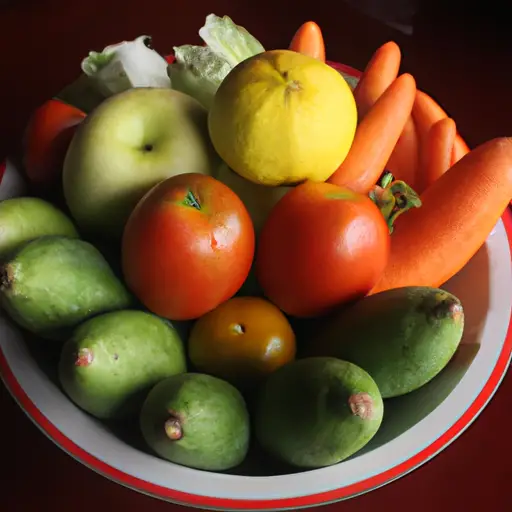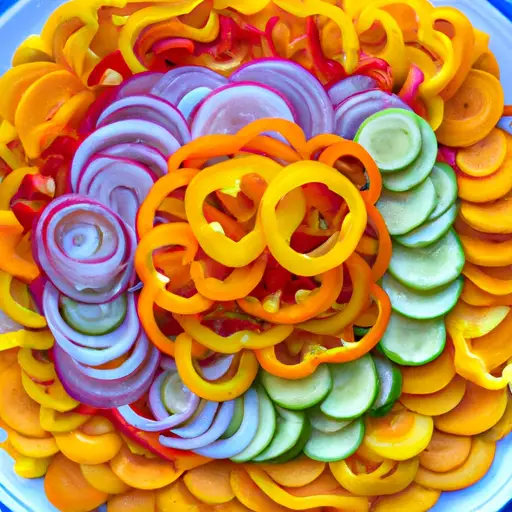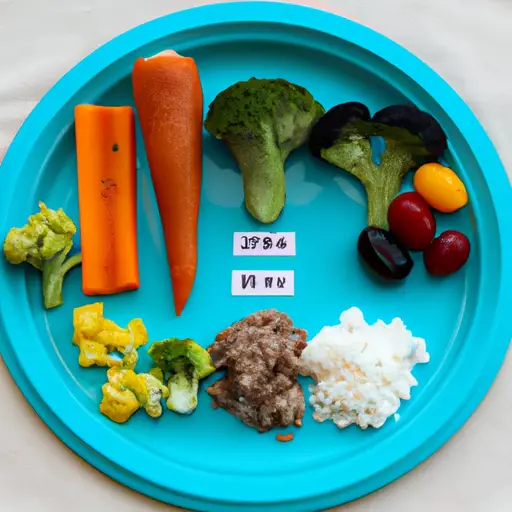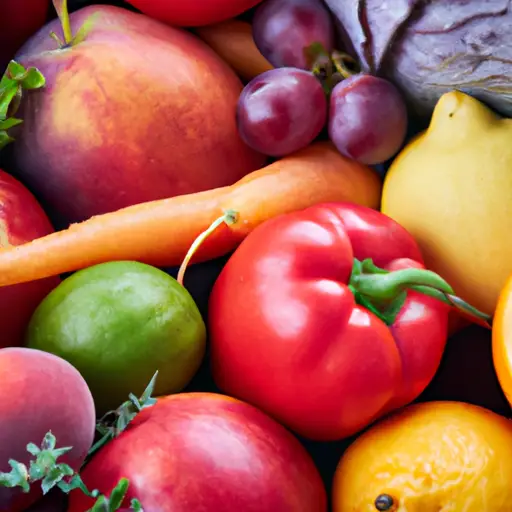Achieve Optimal Health The Benefits of High-Fiber Diets
Welcome to My Blog on Gut Health!
Hey there, friends! Today, I want to talk about gut health and the benefits of a high-fiber diet. So, what is gut health anyway? Well, it refers to the balance and function of the microorganisms that live in your digestive tract. And did you know that what you eat can have a big impact on your gut health? That’s right! A diet high in fiber can do wonders for your digestive system.
What in Tarnation Is Fiber Anyway?
Before we start talking about how fiber impacts gut health, we need to understand what fiber is. So, what is it, you may ask? Well shucks, fiber, also known as roughage, is a type of carbohydrate that can’t be broken down by our bodies. It passes through our digestive system mostly intact, and *poof*, out it goes. You can find fiber in fruits, vegetables, whole grains, beans, nuts, and seeds. Yeehaw!
Overall, there are two types of fiber, soluble and insoluble. Both types help us poop, but soluble fiber dissolves in water and can help lower cholesterol levels, while insoluble fiber does not dissolve in water and adds bulk to our poop. Now ain’t that just peachy!
If you’re curious about the different types of fiber found in food, I highly recommend moseying on over to Lovely Life of Leah to learn more (she knows her stuff).
Fiber: The Gut’s Best Friend
Let’s talk digestion, shall we? It’s not always the most comfortable subject, but it’s an important one. And one key player in keeping our digestive system in tip-top shape is fiber.
First things first – what exactly is fiber? In simple terms, fiber is the roughage found in plant-based foods that our bodies can’t fully digest. Fiber comes in two forms: soluble and insoluble. Soluble fiber dissolves in water and becomes gel-like in our guts, while insoluble fiber passes through our digestive system mostly intact.
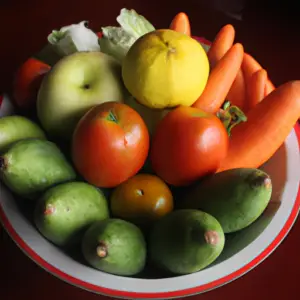
Now, how does fiber help us digest our food? Great question. One way is by bulking up our stool, making it easier to pass through our intestines. This can help prevent constipation and promote regular bowel movements. Additionally, fiber can bind to toxins and waste products in our intestines, carrying them out of our bodies.
But that’s not all – fiber also plays a role in promoting healthy bacteria in our guts. Our gastrointestinal tract is home to millions of microbiota, or bacteria. These tiny organisms can have a big impact on our overall health, and fiber helps feed the good bacteria, keeping our microbiome diverse and balanced.
So there you have it – from bulking up your stool to supporting a healthy gut microbiome, fiber is a crucial component of our digestive health.
Why a High-Fiber Diet is Great for My Gut Health
As an avid foodie, I am constantly looking for ways to nourish my body while still enjoying delicious meals. That’s why I love incorporating high-fiber foods into my diet, not just for their taste but also for their incredible benefits to my gut health.
First and foremost, a high-fiber diet can improve digestion. This is because fiber adds bulk to stool, making it easier to pass through the intestines. It also helps to increase the frequency of bowel movements, reducing the risk of constipation and other digestive issues.
But the benefits don’t stop there. Eating a diet rich in fiber has also been linked to a lower risk of digestive diseases such as diverticular disease and colon cancer. This is because fiber helps to remove waste and toxins from the body, reducing the risk of harmful substances accumulating in the colon.
Another key benefit of a high-fiber diet is reduced inflammation. Fiber has been found to have anti-inflammatory properties, which can help to reduce inflammation in the gut. This is important because chronic inflammation has been linked to a range of health problems, including digestive diseases, heart disease, and even cancer.
So, what are some foods that are high in fiber? My personal favorites include fruits such as raspberries and pears, vegetables like broccoli and sweet potatoes, and whole grains such as brown rice and quinoa. Incorporating these foods into your diet is easy, too. Try starting your day with a fiber-rich breakfast like oatmeal with fruit and nuts, or adding some extra veggies to your lunchtime salad.
Overall, a high-fiber diet is one of the best things you can do for your gut health. Not only does it improve digestion and reduce inflammation, but it also helps to prevent a range of digestive diseases. So next time you’re feeling a little bloated or sluggish, try reaching for a fiber-rich snack and see how your gut thanks you!
5. Foods High in Fiber
Let’s talk about some tasty foods that will help you increase your fiber intake! One of my go-to options is oatmeal. A cup of cooked oatmeal contains about 4 grams of fiber, which is a great way to kickstart your day. Another breakfast favorite of mine is chia seeds. These tiny seeds are packed with fiber, protein, and omega-3 fatty acids. Add them to your smoothies or mix them into your yogurt for a fiber boost.
Fruits are also an excellent source of fiber. Apples, for example, have about 4 grams of fiber per medium-sized fruit, along with essential vitamins and antioxidants. Berries are another great option, as they are low in sugar and high in fiber. Try adding them to your morning cereal or snacking on them throughout the day.
Vegetables are another way to increase your fiber intake. Broccoli, for instance, has about 5 grams of fiber per cup, and it’s a versatile vegetable that can be cooked in various ways. Spinach is also an excellent option, as it is high in fiber and iron. You can add it to your salads, smoothies, or sauté it with other vegetables for a quick and easy side dish.
Finally, legumes are a fiber powerhouse. They include beans, lentils, and chickpeas, all of which are packed with fiber and protein. A half-cup of black beans contains about 7.5 grams of fiber, which makes them an excellent addition to salads, soups, or tacos.
Remember, incorporating more fiber-rich foods into your diet can make a significant difference in your gut health. So, try to be creative with your meals and experiment with different fiber-rich foods to find your favorites!
Summary of Fiber’s Benefits on Gut Health
In conclusion, choosing to incorporate more fiber in my diet has been a game-changer for my gut health. Not only have I noticed an improvement in my digestion, but I am also reducing my risk of developing digestive diseases in the future.
By consuming fiber-rich foods, I am promoting the growth of healthy bacteria in my gut, which can help reduce inflammation and improve overall gut health. It’s important to note that there are many sources of fiber, including fruits, vegetables, legumes, and whole grains.
While it may seem daunting to incorporate more fiber into your meals, it’s easier than you think. Simple tips, such as swapping white bread for whole-grain bread or snacking on fruits and vegetables throughout the day, can make a big difference. Remember, small changes can lead to big improvements in gut health.
Bottom line, a high-fiber diet is an accessible and effective way to prioritize gut health. By adding more fiber to your diet, you may notice improvements in digestion and overall well-being. Don’t be afraid to experiment with different fiber-rich foods and find what works best for you and your body.
